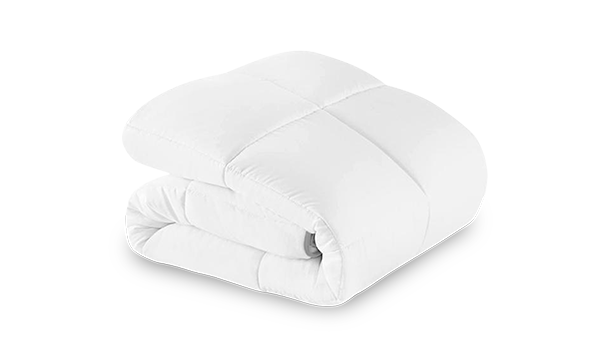We all know a cozy night’s sleep is essential for a better sense of well-being. Choosing the right bedding can go a long way to help you accomplish better sleep.
Not only does the right kind of sleep setup keep your space looking beautiful aesthetically, but your bedroom also has the potential to contribute to the length and quality of your rest, which is why it’s so deserving of some extra consideration.
To find the right kind of bedding for your comfort, it’s essential to understand the differences between a duvet vs comforter. If you’re still not sure what a duvet is, how it’s different from a comforter, and where exactly a duvet cover comes in all of this - don’t worry, we’ve got you covered (no pun intended!). Here’s everything you need to know.
The Great Debate - Duvet vs Comforter
In the world of bedding, two major players vie for supremacy: the duvet and the comforter. The distinction between these bedding types often leaves shoppers perplexed. If you're struggling with the duvet vs comforter debate, we're here to help you unravel the mystery.
What Is A Duvet?

A duvet is a type of bedding that originates from Europe. It's a flat bag filled with down, feathers, wool, or synthetic alternatives, which is typically white in color and used with a protective cover.
To put it simply, a duvet cover is used to cover a duvet. Duvets regularly come with removable duvet covers that allow you to change the look of your bed from time to time.
You’ll find most bedding and home furniture stores sell a variety of patterned duvet covers that you can use to really customize the look of your bedroom.
What Is A Comforter?
Comforters, on the other hand, are a type of thick, quilted blanket filled with synthetic fiber filler. They are often colored or patterned, eliminating the need for a separate cover.
A comforter is different from a duvet and duvet cover, though it can often get mixed up with one and sometimes is used interchangeably to describe one. Popularly called a quilt, comforters are a kind of bedding made of two different lengths of fabric that are sewn together, filled with similar material to a duvet, and then quilted to create extra padding and softness during sleep.
Difference Between Duvet and Comforter
While duvets and comforters serve similar purposes, the main difference lies in their design and use. A duvet is generally thicker and warmer, used with a changeable cover, while a comforter is a one-piece unit that doubles as a bedspread and does not require additional covers.
What is a Duvet Cover Used For?
A duvet cover, as the name suggests, is a protective layer that slips over the duvet and has a closure. Besides protecting the duvet, it also allows for easy changes in style or color to match the room decor. It’s an effective way to keep your duvet clean, reducing the frequency of washes.
Pros of a Duvet
- Versatility: With a duvet, you can change the look of your bedroom in minutes. Simply switch out the duvet cover for a different design or color to match your mood or decor.
- Warmth: Duvets tend to be warmer than comforters. They're designed to be used alone, without additional layers, making them a perfect option for those living in cooler climates or who prefer a cozier bed.
- Easy to Clean: Because you're primarily washing the cover rather than the duvet itself, maintenance can be easier. Most duvet covers are machine-washable, making them more convenient for those with busy lifestyles.
Cons of a Duvet
- Initial Cost: Duvets can be more expensive upfront, especially when you factor in the cost of purchasing separate covers.
- Difficult to Assemble: Putting a duvet cover on after washing it can be a bit of a challenge until you get the hang of it.
Check out Puffy mattress reviews from real customers and see how we compare with other brands.
What is a Comforter Used For?
A comforter serves dual purposes. Not only does it provide warmth, but it also serves as a bedspread, offering a decorative element to your bed. With a variety of patterns and colors available, a comforter can be the centerpiece of your bedroom decor.
Pros of a Comforter

- Easy to Use: Comforters are an all-in-one solution, and there's no need to buy separate covers. Just lay it on your bed, and you're good to go.
- Variety: Comforters come in a wide range of colors, patterns, and designs. You can find one to match almost any decor style.
- Lower Initial Cost: Generally, comforters are less expensive than duvets, especially because you don't need to buy separate covers.
Cons of a Comforter
- Frequent Washing: Since comforters serve as both a bedspread and a warm layer, they may need to be washed more frequently than duvets.
- Less Warm: Comforters are generally not as warm as duvets, which might require additional layers during colder months.
Duvet vs Comforter: Which is Better?
Choosing between a duvet and a comforter depends on personal preference. If you prefer easy care, a vibrant aesthetic, and less frequent laundering, a comforter may be your best bet. If you value versatility, warmth, and enjoy changing up your bedroom's look frequently, a duvet might be more up your alley.
Conclusion: Choosing Between Duvet and Comforter
The duvet vs comforter debate boils down to your lifestyle and preferences. Both have their unique advantages. Comforters offer ease and completeness, while duvets provide warmth and versatility.
Your choice between a duvet and a comforter should ultimately ensure a cozy, comfortable, and stylish bed to lay your head at night. Sleep tight!

- Oeko-Tex® Standard 100 certified.
- Hypoallergenic.
- Lifetime warranty.
- 101-night sleep trial.
- Free shipping and returns.












